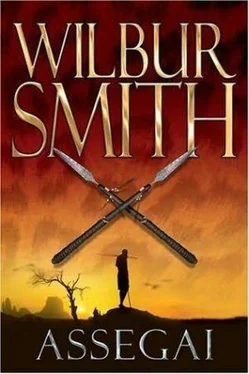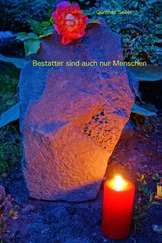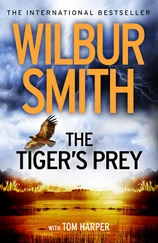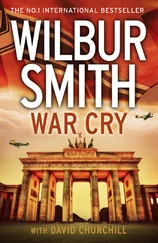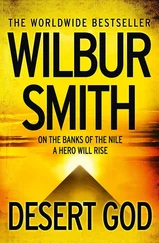Gasping for breath, Leon looked around wildly. The torch was lying in the doorway where he had thrown it. It was still alight but there was nothing for the flames to catch. More dangerously, though, he had not managed to extinguish the plank before Gustav leaped upon him. Now the flames had rekindled and were burning up brightly. Leon picked it up and ran with it to the entrance. He hurled it outside, then turned his attention to the torch. As he bent to pick it up he heard a scuffling sound behind him and ducked to one side. He heard something hiss past his right ear. He whirled around.
Gustav had armed himself with an eight-pound sledgehammer from the workbench against the wall. Then he had charged at Leon and, both hands gripping the long handle, had swung it at Leon’s head. If Leon had not ducked, it would have shattered his skull. The force of the swing had set Gustav off-balance, and before he could recover, Leon grabbed him in a bear-hug, trapping the hammer between their bodies. They spun around in a deadly waltz, shifting weight and balance, trying to trip or lift the other off the ground.
Leon was the taller by four inches, but Gustav matched him in weight and was solid muscle, tempered and hardened by a lifetime of physical work. The punishment Leon had dealt him would have incapacitated a lesser fighter, and Gustav’s resilience was frightening. His strength seemed to increase as the adrenalin coursing through his body countered the agony of his injuries. He drove Leon back towards the doorway where the burning torch lay. Leon felt its heat on the back of his legs. Then Gustav swivelled and pushed his hip under his adversary. For a fleeting second Leon was off-balance and Gustav aimed a mighty kick at the torch. He sent it bouncing across the floor until it slammed into the base of the wooden pyramid. The hangar was filled with smoke and the smell of burning.
Like a leopard mad with rage, Leon found a hidden reservoir of strength. He shifted in Gustav’s arms and hooked one of the man’s heels with his toe, tripping him backwards. Gustav crashed to the ground with Leon’s full weight on top of him. The air was forced out of his chest in a loud whoosh . Leon broke away, vaulted to his feet like a gymnast and ran to retrieve the torch from the wood. Two pieces were already alight but he had just enough time to drag them out of the pile and hurl them aside before Gustav was on him again. He was swinging the sledgehammer in great sweeps at Leon’s face, forcing him to back away. The German was wheezing as he sucked air into his lungs. The back of his shirt was black with blood from the wound in his scalp and the front of his breeches from where Leon’s spur had gouged him, but he was beyond pain. The hammer swung like a metronome, back and forth, and Leon was forced to give ground before the menace of its heavy steel head.
He came up short with his back against the corner of the hangar wall. The angle prevented him breaking out and he knew that Gustav had him trapped. With both hands Gustav lifted the hammer high, and paused with it aimed at Leon’s head. Leon knew that when the blow came he could not avoid it. There was simply not enough space for him to dodge. He stared into Gustav’s eyes, trying to read his intention, trying to control him with the force of his gaze, but schnapps and pain had turned the man into an animal. In his eyes there was no trace of recognition or mercy.
Then Gustav’s expression changed subtly. The mad rage faded from his eyes, replaced by bewilderment. He opened his mouth, but before he could speak a thick gout of bright blood spewed over his lips. The hammer dropped and clattered to the hangar floor. He looked down at his body.
The blade of a Masai assegai stood out three hands’ breadth from the centre of his chest. He shook his head as though in disbelief at what he was seeing. Then his legs buckled. Manyoro was standing close behind him, and as Gustav fell, he plucked out the blade from where he had driven it home. The German’s heart must still have been beating, for a small fountain of blood spurted from the gaping wound and shrivelled as Gustav died.
Leon stared at Manyoro. His mind seethed with wild conjecture. The last time he had seen Manyoro was almost a week ago on Lonsonyo Mountain. How had he arrived so fortuitously? Then he saw that Loikot was with him and, before he could stop him, had plunged his own assegai into the inert body.
Leon was assailed by horror and dread. No matter the circumstances in which it had happened, they had killed a white man. There would be retribution in the form of the hangman’s noose. The administration of the colony could not afford to condone such a heinous offence in a land where whites were outnumbered fifty to one by tribesmen. It would set too dangerous a precedent. His mind racing, Leon demanded of the two Masai, ‘How did you get here?’
‘When the soldier took you from Lonsonyo we followed you.’
‘I owe my life to you. The Bula Matari would have killed me, but you know what will happen if the police catch you.’
‘No matter,’ Manyoro said, with dignity. ‘They can do with me as they wish. You are my brother. I could not stand by and watch him kill you.’
‘Does anybody else know you are in Nairobi?’ Leon asked, and they shook their heads. ‘Good. We must work quickly.’
Between them they wrapped Gustav’s corpse in a tarpaulin from the storeroom with a fifty-pound crank shaft lashed to his feet. They trussed it securely with lengths of hemp rope, then carried it to the Butterfly and loaded it into the main bomb bay in the fuselage. Still working fast, they tidied the hangar, getting rid of any trace of the fight and the fire. They carried out the remains of the packing cases and stacked them on the woodpile behind the Polo Club. Then they spread fresh earth over the bloodstains, trampled it down and sprinkled engine oil over the spot to disguise the nature of the stains. If any questions were asked about Gustav’s disappearance it would be assumed that he had gone on the run to escape arrest and incarceration in a concentration camp.
When Leon was satisfied that they had covered up as much of the incriminating evidence as they could, they wheeled the Butterfly out of the hangar and he climbed into the cockpit to begin his start-up procedures. The two Masai stood ready to swing the propellers. Then they stiffened and stared into the darkness from which came the sound of a horse at full gallop.
‘Police?’ Leon muttered. ‘I have the corpse of a murdered man on board. This could mean trouble.’
He held his breath, then released it as Max Rosenthal rode out of the night and dismounted. He carried a large rucksack slung on his back as he hurried to the side of the Butterfly . ‘You told me you’d help me,’ he said, looking hunted and terrified. ‘Up at the parade-ground they’ve just shot three Germans they accused of being spies. Mr Courtney, you know I’m no spy.’
‘Don’t worry, Max, I’ll take you out,’ Leon reassured him. ‘Climb aboard!’
As soon as the engines started, the two Masai scrambled up to join Max in the cockpit and, with the waxing moon lighting the way, Leon took off and turned south, heading for the border with German East Africa. Three hours later the silver expanse of Lake Natron came up ahead, shining like a mirror in the moonlight. Leon let the Butterfly sink down until they were skimming its surface. He flew into the centre before he pulled the lever that opened the bomb bay, then leaned over the side of the cockpit and watched the tarpaulin-shrouded corpse plummet into the soda-rich water. It raised a splash of white foam. He circled back low over the surface to make certain that it had not floated, but the metal ballast had pulled it under and there was barely a ripple to be seen.
Читать дальше
